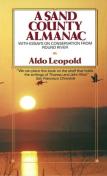BKMT READING GUIDES
A Sand County Almanac (Outdoor Essays & Reflections)
by Aldo Leopold
Published: 1986-12-12
Mass Market Paperback : 320 pages
Mass Market Paperback : 320 pages
0 members reading this now
1 club reading this now
0 members have read this book
1 club reading this now
0 members have read this book
"We can place this book on the shelf that holds the writings of Thoreau and John Muir." San Francisco Chronicle
These astonishing portraits of the natural world explore the breathtaking diversity of the unspoiled American landscape -- the mountains and the prairies, the deserts and the ...
These astonishing portraits of the natural world explore the breathtaking diversity of the unspoiled American landscape -- the mountains and the prairies, the deserts and the ...
No other editions available.
Jump to
Introduction
"We can place this book on the shelf that holds the writings of Thoreau and John Muir." San Francisco Chronicle
These astonishing portraits of the natural world explore the breathtaking diversity of the unspoiled American landscape -- the mountains and the prairies, the deserts and the coastlines. A stunning tribute to our land and a bold challenge to protect the world we love.
Editorial Review
Published in 1949, shortly after the author's death, A Sand County Almanac is a classic of nature writing, widely cited as one of the most influential nature books ever published. Writing from the vantage of his summer shack along the banks of the Wisconsin River, Leopold mixes essay, polemic, and memoir in his book's pages. In one famous episode, he writes of killing a female wolf early in his career as a forest ranger, coming upon his victim just as she was dying, "in time to watch a fierce green fire dying in her eyes.... I was young then, and full of trigger-itch; I thought that because fewer wolves meant more deer, no wolves would mean hunters' paradise. But after seeing the green fire die, I sensed that neither the wolf nor the mountain agreed with such a view." Leopold's road-to-Damascus change of view would find its fruit some years later in his so-called land ethic, in which he held that nothing that disturbs the balance of nature is right. Much of Almanac elaborates on this basic premise, as well as on Leopold's view that it is something of a human duty to preserve as much wild land as possible, as a kind of bank for the biological future of all species. Beautifully written, quiet, and elegant, Leopold's book deserves continued study and discussion today. --Gregory McNameeDiscussion Questions
No discussion questions at this time.Book Club Recommendations
Recommended to book clubs by 0 of 0 members.
MEMBER LOGIN
BECOME A MEMBER it's free
Book Club HQ to over 88,000+ book clubs and ready to welcome yours.
SEARCH OUR READING GUIDES
Search
FEATURED EVENTS
PAST AUTHOR CHATS
JOIN OUR MAILING LIST
Get free weekly updates on top club picks, book giveaways, author events and more
Get free weekly updates on top club picks, book giveaways, author events and more
Please wait...








